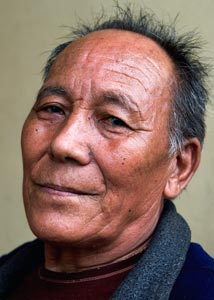Name: Kunchok Jungnay
(Alias: No)
Gender: Male
Interview Age: 71
Date of Birth: 1936
Birthplace: Bala, Kham, Tibet
Year Left Tibet: 1958
Profession: Farming
Monk/Nun: No
Political Prisoner: No

Interview No.: 22
Date: 2007-06-26
Language: Tibetan
Location: Lugsung Samdupling Settlement, Bylakuppe, Karnataka, India
Categories: Resistance and Revolution
Keywords: Chinese -- first appearance of, Chushi Gangdrug guerrillas, Dalai Lama -- escape, escape experiences, Kham, refugee in India -- life as, resistance fighters
Summary:
Kunchok Jungnay first became aware of the Chinese in Tibet when he saw an airplane fly over his region, which caused great fear among the people. Never having seen an airplane before, they called it the chasha 'iron bird.' When the Chinese initially arrived in his village, they flattered the small children and gave them cigarettes. Once they became addicted to the nicotine, the Chinese would not give them any more cigarettes.
Kunchok Jungnay left his village, Birizong, at around 23 years of age and joined the Tibetan Chushi Gangdrug Volunteer Force at Chatsa Diguthang. The Chinese army approached in large numbers, while the resistance fighters numbered only 50 to 100 horsemen at the most. The Chushi Gangdrug members fought for three days and nights, but ultimately lost the battle.
Kunchok Jungnay recalls terrifying moments during the attack when bullets from Chinese guns were "popping like grains frying over a fire." After escaping to India, Kunchok joined the Indian Army at Chakrata. He served there for 14 years and then moved to Bylakuppe, India, where he lives with his family. When Kunchok visited Tibet in 1989, Kunchok learned that his parents had died of starvation in 1969.
Interview Team:
- Martin Newman (Interviewer)
- Tenzin Yangchen (Interpreter)
- Tsewang Dorjee (Videographer)

